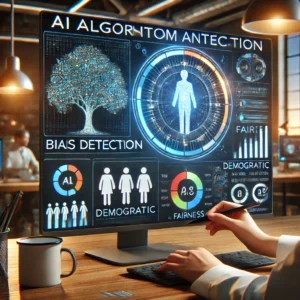
As artificial intelligence becomes more integral to society, ensuring its ethical development and deployment is crucial. This article delves into the latest AI policies and regulations, exploring how governments, organizations, and industries are working to address concerns like data privacy, bias, accountability, and transparency.
Through insights on regional regulatory approaches, case studies, and expert perspectives, this comprehensive guide outlines the challenges and potential solutions in governing AI. Discover the policies shaping AI’s future and the implications for businesses, developers, and society.
Ethics and Governance in AI
Artificial intelligence (AI) is transforming nearly every sector, from healthcare and finance to transportation and education. However, with the rapid expansion of AI’s capabilities and applications, questions around ethics and accountability have become increasingly critical. Ensuring that AI systems are developed and deployed responsibly requires robust governance frameworks which address issues such as data privacy, fairness, transparency, and accountability. Governments and organizations worldwide are working to create policies and regulations that guide the ethical use of AI, balancing innovation with social responsibility.
This article explores the ethical challenges and regulatory approaches currently shaping the AI landscape. It provides insights into the main ethical issues in AI, highlights key policies from different regions, and examines the implications for various stakeholders, including businesses, developers, and consumers.
Key Ethical Issues in AI
Ensuring ethical AI involves addressing various complex issues. As AI systems become more autonomous, they impact human lives in ways that require careful consideration. Below are some of the major ethical concerns associated with AI.
1. Data Privacy and Security
AI relies on vast amounts of data to learn and make predictions. This often includes personal data, raising concerns about privacy and security. The unauthorized use or mishandling of data can lead to serious breaches of privacy.
- Data Collection and Consent: AI systems need data to function, but collecting this data raises questions about consent. Users are often unaware of how their data is being used and shared.
- Data Security: AI-driven applications, especially in sectors like healthcare and finance, require stringent security protocols to prevent data breaches and protect user privacy.
2. Bias and Fairness
AI systems can inherit biases present in the data on which they are trained, leading to unfair outcomes. These biases can perpetuate discrimination, especially in sensitive areas like hiring, lending, and law enforcement.
- Algorithmic Bias: AI can reinforce societal biases if the training data contains biased patterns. For example, facial recognition systems often have higher error rates for certain demographic groups, raising concerns about fairness.
- Equal Treatment: Ensuring AI systems provide fair treatment across different demographics is a major ethical priority. Developers are responsible for auditing AI systems and ensuring diverse, representative data training.
3. Transparency and Explainability
AI systems, especially deep learning models, can be complex and difficult to interpret. This lack of transparency makes it challenging to understand how decisions are made, which is crucial in high-stakes areas such as healthcare and finance.
- Black-Box Problem: Many AI models function as “black boxes,” meaning their internal workings are not easily understood. This obscurity can hinder accountability and make it difficult for users to trust the outcomes.
- Explainable AI: Efforts are underway to make AI systems more interpretable. Explainable AI initiatives aim to increase transparency by developing models that can provide clear, understandable reasons for their decisions.
4. Accountability and Liability
As AI systems become more autonomous, determining accountability in cases of harm or error becomes complex. Who should be held responsible if an AI system makes a harmful decision—the developer, the company, or the AI system itself?
- Legal Responsibility: Establishing clear guidelines on legal liability for AI-driven actions is essential. This includes defining who is responsible for AI-related errors or damages, especially in autonomous vehicles, medical diagnostics, and financial advice.
- Moral Responsibility: Beyond legal accountability, there is also a question of moral responsibility in AI development. Developers and companies must consider the societal impact of their AI systems.
Global Approaches to AI Governance and Regulation
Governments and organizations around the world are actively working to establish guidelines and regulations for AI. Here is an overview of some of the major approaches in different regions.
1. The European Union (EU)
The EU has been at the forefront of AI regulation, focusing on ethics, privacy, and accountability. Its General Data Protection Regulation (GDPR) set a global standard for data protection, and the EU’s recent AI Act aims to create a comprehensive regulatory framework for AI.
- GDPR and Data Privacy: GDPR enforces strict guidelines on data collection, requiring explicit user consent and providing users with control over their personal data.
- AI Act: The proposed AI Act categorizes AI applications into risk levels ranging from minimal to unacceptable risk. High-risk applications, such as those in healthcare and law enforcement, are subject to stringent regulations, while unacceptable applications are banned.
2. The United States
The U.S. approach to AI regulation is more decentralized with a focus on innovation and minimal government intervention. However, several government bodies are developing guidelines and policies to address AI ethics.
- Federal AI Initiatives: The National Institute of Standards and Technology (NIST) has developed an AI Risk Management Framework to help organizations manage the risks of AI.
- Ethical Principles: Federal agencies have outlined principles such as transparency, fairness, and accountability in AI, though the U.S. lacks a comprehensive federal law for AI.
3. China
China has a proactive approach to AI governance, aiming to become a global leader in AI while maintaining state control over data and ethical standards. China’s AI regulations focus on national security, economic development, and ethical principles.
- Ethics Guidelines: The Chinese government released the “New Generation Artificial Intelligence Ethics Code,” emphasizing harmony, fairness, and transparency in AI.
- Social Credit System: AI is used in China’s social credit system, which assesses individuals based on their behavior and adherence to rules. This system raises significant ethical concerns about surveillance and personal freedom.
4. Other Countries and International Efforts
Various other countries, including Canada, Japan, and Singapore, are also working on AI governance, often focusing on data privacy, transparency, and human rights. International bodies like the Organization for Economic Co-operation and Development (OECD) are developing guidelines to encourage ethical AI practices globally.
- OECD AI Principles: The OECD AI Principles emphasize human-centered values, transparency, accountability, and robustness in AI development.
- G20 AI Guidelines: G20 nations have agreed on a set of AI principles that promote trust and inclusivity, encouraging responsible innovation across borders.
Case Studies: AI Governance in Action
Case Study 1: GDPR and Facial Recognition in the EU
The EU’s GDPR has impacted the use of facial recognition technology across Europe. Companies are required to obtain explicit consent before collecting biometric data. This regulation has limited the widespread adoption of facial recognition in public spaces, highlighting the importance of consent and data privacy.
Case Study 2: Algorithmic Accountability in New York City
New York City passed a law requiring companies to audit algorithms used in hiring for bias. This law emphasizes accountability in AI, particularly in employment decisions, to prevent discriminatory practices and ensure fair treatment across demographics.
Case Study 3: China’s Social Credit System
China’s social credit system uses AI to monitor and assess individuals’ behavior. While this system promotes adherence to laws, it raises ethical concerns around surveillance and freedom. The system illustrates how AI can be used for social control, emphasizing the need for transparent governance.
Case Study 4: Canada’s Directive on Automated Decision-Making
Canada has introduced a Directive on Automated Decision-Making for government services, which includes an Algorithmic Impact Assessment to evaluate the risks and ethical implications of AI systems. This directive aims to ensure fair, transparent, and accountable decision-making in public services.
Case Study 5: Ethical AI Standards by the IEEE
The Institute of Electrical and Electronics Engineers (IEEE) has developed a set of ethical standards for AI, including guidelines on transparency, privacy, and fairness. These standards serve as a resource for companies and developers to align their AI projects with ethical principles.
The Future of AI Governance
As AI continues to evolve, so too will the policies and regulations surrounding it. The future of AI governance will likely focus on the following areas:
- Global Standardization: Creating universal AI ethics standards could facilitate international cooperation and ensure consistent ethical practices across borders.
- Algorithmic Transparency: Regulations that mandate algorithmic transparency will be crucial for building public trust in AI systems, particularly in sectors like healthcare, finance, and law enforcement.
- Human-AI Collaboration: Future regulations may emphasize the importance of human oversight in AI systems, ensuring that humans remain in control of critical decisions.
- Inclusive AI Development: Governments and organizations will continue to work toward reducing biases in AI by promoting diversity in data and inclusive development practices.
FAQ
Q1: What are the main ethical concerns associated with AI?
A1: Key ethical concerns include data privacy, bias and fairness, transparency, and accountability. Addressing these issues is essential to ensuring responsible and trustworthy AI development.
Q2: How does the EU regulate AI?
A2: The EU regulates AI through policies like the GDPR for data privacy and the AI Act, which categorizes AI applications by risk level and sets stringent rules for high-risk applications.
Q3: Why is transparency important in AI?
A3: Transparency is essential to help users understand how AI systems make decisions. It builds trust and enables accountability, particularly in areas with high social impact like healthcare and finance.
Q4: How is China approaching AI governance?
A4: China’s AI governance focuses on national security, economic development, and ethical principles, with strict controls over data use. China’s social credit system highlights both the potential and ethical risks of AI for social monitoring.
Q5: What is the future of AI governance?
A5: Future AI governance will likely include global standardization, enhanced transparency requirements, emphasis on human oversight, and inclusive AI development practices to reduce biases.
With the increasing impact of AI on society, the need for ethical governance and regulatory frameworks is greater than ever. As governments and organizations worldwide work to address these challenges, a balanced approach to innovation and responsibility is essential to building a future where AI benefits all of society.





